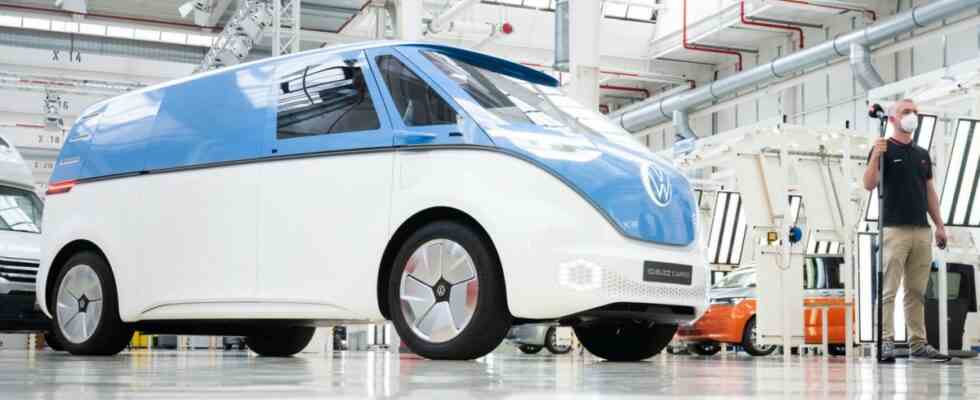The most important issue is only touched upon in the foreword: Many governments in Europe are pissed off about a massive US subsidy program for green products. Because subsidies are often only paid in full if the products – such as electric cars – have been largely manufactured in US factories. European corporations could therefore relocate plants. However, the final statement for the meeting of the US-Europe Trade and Technology Council only says that the US government “acknowledges the concerns of the EU” and will “address them constructively”. That’s what the 26-page draft of the document says Süddeutsche Zeitung present.
In the Trade and Technology Council, which was founded just a year ago, American ministers hold discussions with top representatives of the EU Commission. This Monday takes place the third meeting held, this time at the University of Maryland near Washington. Commission Vice-Presidents Margrethe Vestager and Valdis Dombrovskis are arriving from Brussels. The body is intended to promote cooperation on technological standards, securing supply chains, for example for semiconductors, and removing trade barriers. But now the dispute over President Joe Biden’s subsidy law – the so-called Inflation Reduction Act – overshadows the meeting.
The EU Commission and the American government founded six weeks ago a working groupto find a solution to the dispute. President Biden conceded during a visit by French President Emmanuel Macron last Thursday that there were minor flaws in the law that could be discussed and addressed.
What is clear, however, is that the actual legal act will no longer be changed. The US government may be able to accommodate the Europeans with the rules for implementation. This will be discussed at the Trade and Technology Council meeting over lunch. From the Commission’s point of view, this should be the moment of truth. Deputy Dombrovskis, who is responsible for trade, recently told the SZ that after the conference in Maryland the commission would “take stock and, if necessary, examine next steps”.
Subsidy races are “expensive and inefficient,” warns the EU Commission
One of these steps could be a procedure at the World Trade Organization (WTO). In the end, the Geneva trade watchdogs could allow the EU to react with punitive tariffs. Also, the EU Council of Ministers, the body of member states, conveniently passed a law against unfair subsidies last week finally approved. The regulation empowers the Commission to exclude corporations from Asia or America from government tenders or to ban them from takeovers if they are nurtured with unfair subsidies at home. Brussels could perhaps use this against US companies that benefit from the Inflation Reduction Act.
France’s government is also campaigning for the EU to set up its own subsidy programs that, like US law, only support products from domestic factories. But trading partners like Japan and South Korea would then storm against this discrimination. And Vice-Commissioner Dombrovskis warns that subsidy races are “expensive and inefficient” anyway. Another problem is that rich countries like Germany could support their industry much more generously than cash-strapped countries like Italy.
Internal Market Commissioner Thierry Breton demanded because of that last week at a conference in Berlin to “rapidly” set up an EU fund “with appropriate financial firepower” to help strategically important industries. His boss Ursula von der Leyen laid on Sunday at a speech in Bruges, Belgium. The Commission President announced that she would relax the strict EU rules on state aid in response to Biden’s law. “We have to see how we can make the regulations simpler and more predictable” for corporations, said the German.
In addition, governments should not only be able to support innovation, but also the development of mass production, she suggested. In order to be able to cushion differences in the financial strength of member states, von der Leyen also demanded “new and additional” EU funds for a “sovereignty fund” in Brussels. He should push research and development as well as “strategic projects” in industry: “A common European industrial policy requires common European funding.”
The US and the EU are working together against China
Compared to this fundamental transatlantic dispute, what the Trade and Technology Council intends to announce on Monday seems rather insignificant. The EU and the USA want to jointly develop standards for trustworthy artificial intelligence; a roadmap for this is to be adopted at the meeting, as stated in the draft of the final declaration. The partners also want to work together on standards for charging stations for electric trucks or for data encryption. The background: Europe and the USA want to prevent China from setting global standards.
Washington and Brussels also want to agree to warn each other if problems are identified in the semiconductor supply chain. The partners also want to be open about their subsidies in this key sector. The final declaration lists many initiatives. But from the EU’s point of view, what counts most is the topic that is only mentioned in the foreword: the dispute over Biden’s green subsidies.

